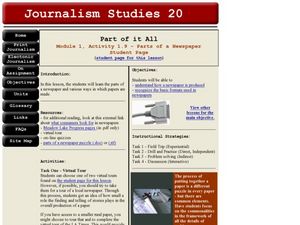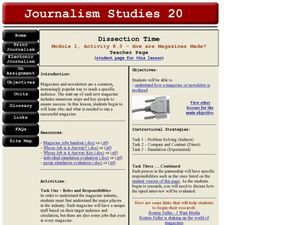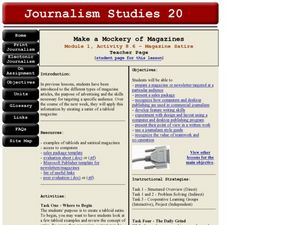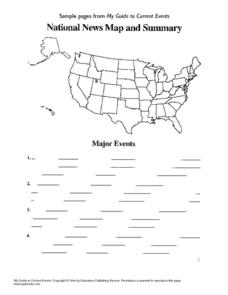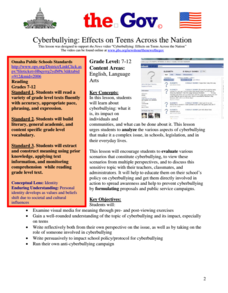Curated OER
Writing a Newspaper-Style Article
Help your secondary reader/writers assess texts by studying press releases from Statistics Canada and drafting articles based on them. They then compare the press release, their own articles, and actual news stories they find online. I'd...
The New York Times
'The Century's Bitterest Journalistic Failure'? Considering Times Coverage of the Holocaust
Rich with primary sources and additional resources, this plan asks class members to think critically about newspaper coverage of the Holocaust. Focusing in particular on the analysis of the article "150th Anniversary: 1851-2001: Turning...
ReadWriteThink
Persuasive Techniques in Advertising
Help your 21st century learners develop their media smarts with this resource that has them examine the persuasive techniques advertisers use to influence specific demographics and then to use these techniques to craft their own ads.
Curated OER
Pass This Jobs Bill
It seems that print media is slowly being replaced by electronic versions. Get your kids reading the New York Times e-style. They'll read the provided article entitled, "Pass This Jobs Bill" then answer six comprehension questions. Two...
Curated OER
Who, What, Where, When, Why, How
Students take a closer look at the organization of news stories. For this journalism lesson, students identify the elements of news stories and then write their news stories on the same topics using different types of leads.
Curated OER
Re-Searching
Students take a closer look at the research cycle. In this journalism activity, students discover and practice Internet searching skills. Students use the search techniques discussed to locate information on selected topics.
Curated OER
Part of it All
Students take a closer look at the organization of newspapers. In this journalism lesson, students take virtual tours of newspapers and complete a newspaper puzzle handout. Students then compare the layout of weekly rural newspapers to...
Curated OER
Dissection Time
Young scholars take a closer look at the organization of magazines. In this journalism lesson, students complete handouts about the jobs and responsibilities in the magazine industry. Young scholars then learn about the steps of...
Curated OER
Make a Mockery of Magazines
Learners examine tabloids. In this journalism lesson, students compare and contrast satirical magazines and then plan, write, and compile their own.
Curated OER
"Journalism in Tennessee"
High schoolers listen to headline from National Enquirer or other tabloid, listen to story "Journalism in Tennessee," compare and contrast connections between Twain's idea of journalism with present day journalism, define vocabulary, and...
Curated OER
Case Studies in Journalistic Ethics - Number 3
Learners investigate ethical decision making when using photos in journalism. In this ethics in journalism lesson plan, students read about the ethical use of images in media, discuss recent controversial photos, and look at online case...
Curated OER
Journalists Under Fire
Students examine journalism in extreme conditions. In this war-zone journalism lesson, students research media coverage of Vietnam, Grenada, the Gulf War, and military actions in Somalia and Kosovo. Students compare coverage in the past...
Curated OER
Walter Cronkite: Witness to History
Students brainstorm a list of news sources. They interview people about today's media and discuss their results. After watching segments of a film about Walter Cronkite, they role play as reporters and subjects from an historic period...
Educators Publishing Service
My Guide to Current Events
Keep your youngsters abreast of current events with these activity worksheets! Or, consider what historical events throughout early American history would have looked like on a national newspaper? Your young historians will become...
PBS
What Makes A Good Video Report?
As part of a media literacy unit, class members establish criteria for good video reporting, and practice giving both positive (warm) and constructive (cool) criticism.
Curated OER
Fact vs. Opinion (Part II)
How can you tell the difference between fact and opinion? Using newspapers, learners determine which articles contain statements of fact, and which articles reflect the writer's opinion. The lesson plan includes a discussion format and a...
Curated OER
What's the News?
Students investigate current events. In this current events lesson, students identify current events from newspaper articles and place them on a timeline.
Curated OER
Conversation Lesson: News
In this conversation lesson worksheet, 7th graders use context clues to get the meaning of 8 words, then select 6 news stories from a list of 12 and explain why they would choose those for an evening TV news broadcast.
PBS
Copyright and Fair Use
When is using someone else's copyrighted material appropriate? Learn about copyright and fair use with a lesson from PBS.org. Scholars read through a reference sheet about authors' rights and users' rights, and then create posters for a...
Curated OER
Cyberbullying: Effects on Teens Across the Nation (Segment 3)
Free speech, privacy, and cyberbullying are the focus of a series of activities that prompt class members to engage in discussions about these interrelated topics. They view a segment from PBS’s series on bullying, read articles about...
Curated OER
The Value of Facebook
Does Facebook actually have any value? Find out what the New York Times thinks by reading this informational article. Learners use the 10 guiding questions to aid them as the read the provided article regarding the value of Facebook. Two...
Curated OER
What Is Your Favorite Place?
Good writing can come from personal places. Budding online authors read an excerpt from a narrative-style newspaper article and then respond to several related writing prompts. They compose blog responses that use vivid imagery to...
Curated OER
Using News Broadcasts in Japan and the U.S as Cultural Lenses
High schoolers view archives of news broadcasts in order to create a context of cultural understanding. They compare and contrast the news broadcasts in Japan and the United States.
Facing History and Ourselves
Hands Up, Don't Shoot!
Why is it so difficult to develop a clear understanding of the events surrounding the shooting of Michael Brown by a Ferguson, Missouri, police officer? To answer this question class members listen to a NPR discussion of the findings of...
Other popular searches
- Journalism and the Media
- Broadcast News
- Broadcast Media
- Journalism Hard News
- Elements of Broadcast News
- Broadcast Media Studies
- Advertising Broadcast Media
- Journalism Media Studies
- Journalism News Ethics








